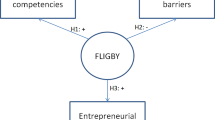Abstract
In this article, this research examines the use of a Serious Game at the end of an entrepreneurship course, following the experiential learning theory which states that learning couldn’t take place if student are unable to experiment what they are learning in class. That is especially true in an entrepreneurship course where understanding how a company works can’t be complete without trying to simulate what is like to be an entrepreneur in real life. The Serious Game makes it possible to; apply concepts acquired in class, in a virtual environment, while eliminating the risk factor. A field survey was conducted to determine the profile of students, their predispositions to use the Serious Game and the influence of the game on the engagement of students in their entrepreneurship learning. This study discusses the results obtained as well as the possibility of adopting Serious Games as a learning tool.





Similar content being viewed by others
Explore related subjects
Discover the latest articles, news and stories from top researchers in related subjects.References
Abouelala, M., Brandt-Pomares, P., and Janan, M. T. (2015). Methodology of selecting CAM software package for education based on a questionnaire. Université Mohamed V, Aix Marseille Université: 18.
Borrajo, F., Bueno, Y., de Pablo, I., et al. (2010). SIMBA: A Simulator for business education and research. Decision Support Systems, 48(3), 498–506.
Charrouf, Y., and Janan, M. T. (2016). Analyse de La Possibilité d’utiliser Des Serious Games Dans Les Enseignements En Éducation à l’entrepreneuriat. Educational Journal of the University of Patras UNESCO Chair. http://ejupunescochair.lis.upatras.gr/index.php/ejupUNESCOchair/article/view/2758. Accessed 7 Aug 2017.
Engeström, Y. (2006). Activity theory and expansive design. Theories and practice of interaction design 3–24.
Huynh-Kim-Bang, B., Wisdom, J., and Labat, J.-M. (2010). Design patterns in serious games: A blue print for combining fun and learning. Project SE-SG. http://seriousgames.lip6.fr/DesignPatterns/designPatternsForSeriousGames.pdf. Accessed 29 July 2017.
Khenissi, M. A., Essalmi, F., & Jemni, M. (2015). Comparison between serious games and learning version of existing games. Procedia - Social and Behavioral Sciences, 191. The Proceedings of 6th World Conference on Educational Sciences, 487–494.
Perron, Y., Turcotte, D., Célestin, T., & Office québécois de la langue française. (2012). Vocabulaire du jeu vidéo. Québec: Office québécois de la langue française http://collections.banq.qc.ca/ark:/52327/2241605. Accessed 12 Oct 2016.
Sabri, H., Cowan, B., Kapralos, B., et al. (2010). Serious games for knee replacement surgery procedure education and training. Procedia - Social and Behavioral Sciences, 2(2), 3483–3488.
Walter, S. G., & Block, J. H. (2016). Outcomes of entrepreneurship education: An institutional perspective. Journal of Business Venturing, 31(2), 216–233.
Zyda, M. (2005). From visual simulation to virtual reality to games. Computer, 38(9), 25–32.
Author information
Authors and Affiliations
Corresponding author
Additional information
Publisher’s note
Springer Nature remains neutral with regard to jurisdictional claims in published maps and institutional affiliations.
Electronic supplementary material
ESM 1
(DOCX 21.0 kb)
Rights and permissions
About this article
Cite this article
Charrouf, Y., Taha Janan, M. The use of a serious game in entrepreneurship teaching. Educ Inf Technol 24, 3841–3854 (2019). https://doi.org/10.1007/s10639-019-09958-4
Received:
Accepted:
Published:
Issue Date:
DOI: https://doi.org/10.1007/s10639-019-09958-4




